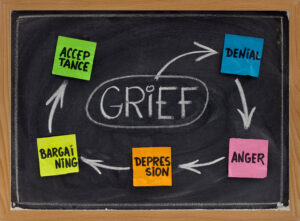
Being a college student comes with responsibilities and gaining experience while navigating a transitional phase of life. Students can deal with work, classes, extracurricular activities, and more all at once. It’s not always easy to handle the workload and pressures of being a student, but adversity can make this even more difficult, and unfortunately, that is commonplace in life. Many college students have to face losing loved ones as they matriculate through school, and finding ways to cope is challenging.
According to the Journal of College Student Development, 60% of college students report losing at least one person close to them by the end of their collegiate career. Mourning as a college student isn’t uncommon, but the intensity of emotions can make students feel like they’re alone.
Healing is a unique process for everyone, and many go through bereavement differently. The five stages of grief include denial, bargaining, anger, depression, and acceptance. These stages can be distinct depending on each person and what they do to cope.
Victoria White, a recent graduate of Florida State University, expressed that she didn’t give herself enough time to heal or face the sadness of her uncle’s passing. Some people going through the grieving process do not feel as though they have the opportunity to slow down due to life’s demands.
“I kept myself busy and tried not to sit in sadness,” White said. “Being connected to my family felt really important and helpful during this time, but I think I rushed my grieving process because life didn’t stop. At the time, it was just easier to cope by focusing on work, activities, and exercising.”
When school and work are overwhelming during the grieving period, a healthy option can be turning to therapy. A therapy session can be a great time to specifically focus on healing, especially because it is with someone equipped and prepared to help.
Stanford Purnell, a clinical social worker and therapist, describes the stages of grief as nonlinear. Purnell suggests multiple ways to actively cope with grief such as writing a letter to the lost loved one, therapy, journaling, and leaning into friends and family during tough times.
“Losing someone while being immersed in your studies can send students through a whirlwind of emotions. Journaling is a great way to release all of those thoughts and keep a log of the days. It is helpful to track your thoughts and feelings throughout the grieving process,” Purnell said. “On a scale of 1-10, some days will be a 3 and some days will be an 8. While taking steps to cope in a healthy manner, it is also important to give yourself grace and patience.”
In addition to journaling, creating different forms of art promotes self-expression and helps students release inner thoughts or emotions. Dedicating time to honor lost loved ones can also bring a strong sense of fulfillment. According to Heal Grief, creating ways of remembering the person lost can be a healthy way of coping. This can look like doing something specific to their interests or carrying on their name through a specific project, donation, or scholarship.
As a student in this position, it is important to speak to professors and others that can alleviate workload stress and help you cope effectively. Professors and other students on campus can help as a support system.
Kimiya Watkins, a senior public relations student, has experienced three familial losses during her college career. Speaking to her professors helped her academically, and the overall experiences stressed the importance of patience and extending compassion to herself and others.
“I let professors know what was going on to give myself a little break so I wouldn’t be overwhelmed with the thoughts of death and school,” Watkins said. “I wish people would understand or acknowledge that when you’re grieving while you’re in college, it’s a lot. People should give more grace.”
Grieving is never easy but it is a universal experience, so it is necessary to know that patience and seeking healthy coping mechanisms can go a long way. Health and wellbeing resources at FAMU specifically can be found at https://www.famu.edu/students/student-resources/health-and-wellbeing/index.php.